How To Get Smells Out Of Wood Furniture
While we might not all be blessed with wide-plank floors and exposed wood beams, there is one aspect of the farmhouse look virtually anyone can achieve at home: whitewashed wood. A favorite among designers and homeowners for its casual, textural look, whitewashing was been a popular (and easy) form of treating wood for centuries—as anyone who's read The Adventures of Tom Sawyer well knows. "In the South we call it 'pickling,'" says KK Harris, owner of Maiden Maxwell. Terms and techniques range depending on your region.
The most popular ways to whitewash wood? 1) Paint it white all-over, and wipe off excess paint with a rag. Or, 2) Mix paint and water and apply that solution with a brush or rag to the wood. I gave the second technique a try, guided by advice from several trusted expert designers. Here's how it went.
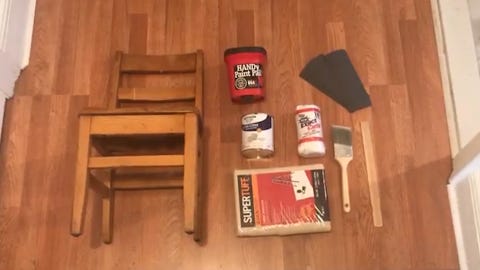
House Beautiful
Supplies
- White paint (Heather French recommends Benjamin Moore's Simply White)
- Paintbrush
- Bucket
- Paint stirrer
- Sandpaper
- Rag
- Wood furnishing or surface
- Dropcloth
Process
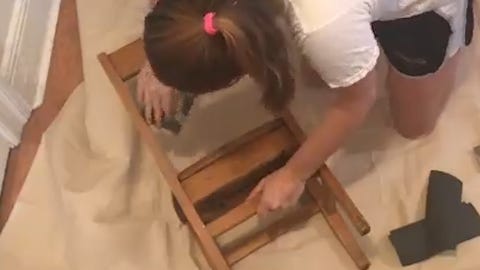
House Beautiful
- Sand and wipe
Begin by thoroughly sanding the wood item or surface you're going to whitewash. I selected an adorable child's chair picked up at my local vintage shop. You want to make sure the paint will adhere to the wood (which is harder when it's watered down), so get any trace of sealant or previous paint off with sandpaper. Then wipe the item down with a rag.
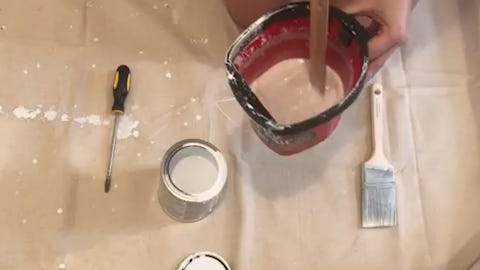
House Beautiful
2. Mix whitewash
Next step: Mix your white paint with water. "I play around with ratios, depending how much wood I want to show through," explains designer Heather French. For a more opaque look, go for a 1:1 ratio (this is French's preference for whitewashed ceilings); if you want it to be a little streakier, add more water. I ended up adding a bit more water so my mixture was probably 3:2 water to paint.
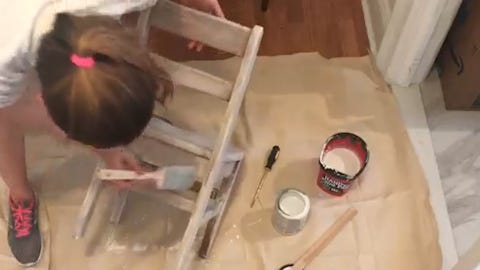
House Beautiful
3. Apply
Now it's time to apply the whitewash. There are three ways to do this, according to designer Susan Jamieson of Bridget Beari Designs, who whitewashes using her firm's own brand of paint. "Apply with a brush for grain, a rag for a smooth look, or pour on for an all-over glaze," she advises. Since I don't mind the look of brushstrokes, I used a paintbrush. Pro tip: Since the whitewash is much thinner than paint out of the can, it will splash and drip MUCH more than regular paint. Be prepared!
4. Add a second coat if desired
Depending on how opaque you want the whitewash (and how watered down your paint mixture is), you may want to add a second coat.
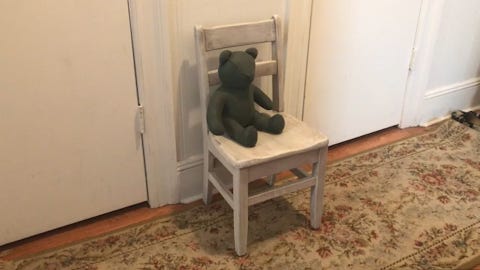
House Beautiful
5. Let dry
Let the whitewash dry. This will likely be quicker than with normal paint, since whitewash is thinner, but give it at least a few hours before touching. And let it sit overnight before using.
6. Enjoy!
And voilà! You have a pretty new piece, ready for styling. "I love how it give old pieces a fun, uncontrived feeling," says French. Us too!
Follow House Beautiful on Instagram.
Hadley Keller Digital Director Hadley Keller is a writer and editor based in New York, covering design, interiors, and culture.
This content is created and maintained by a third party, and imported onto this page to help users provide their email addresses. You may be able to find more information about this and similar content at piano.io
How To Get Smells Out Of Wood Furniture
Source: https://www.housebeautiful.com/design-inspiration/a31813330/how-to-whitewash-wood/
Posted by: baumgardnerruty1945.blogspot.com

0 Response to "How To Get Smells Out Of Wood Furniture"
Post a Comment